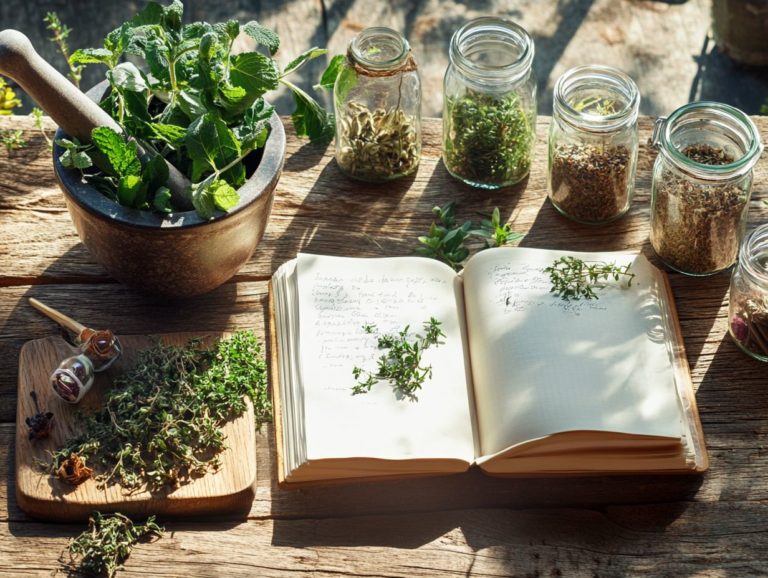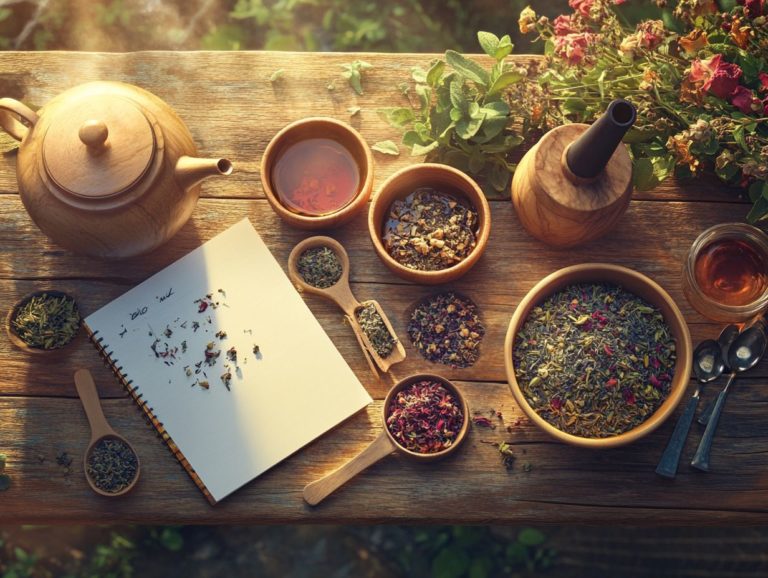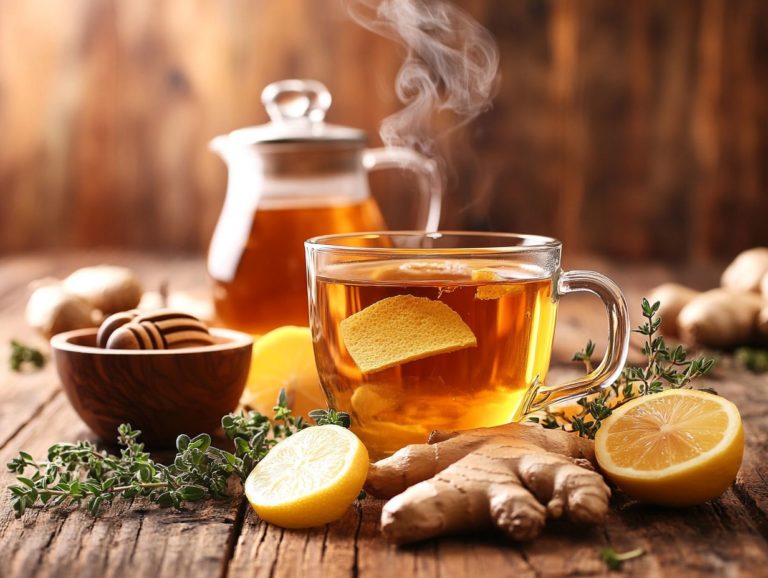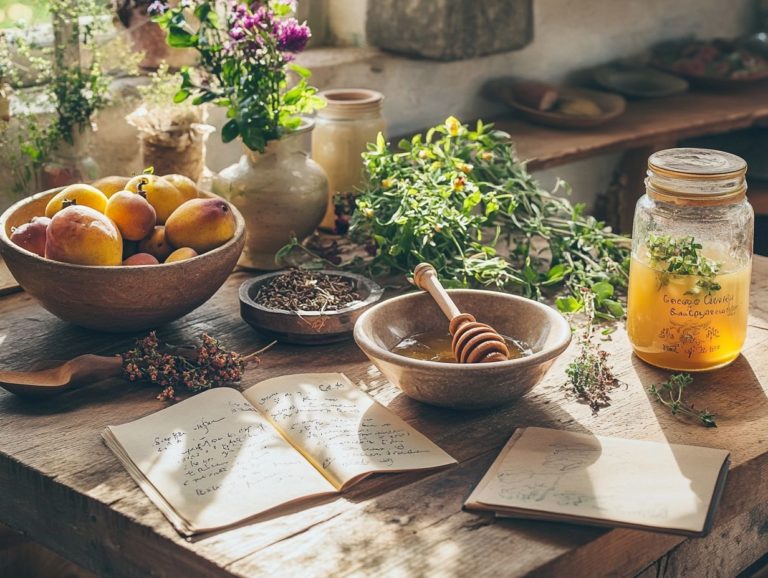5 Must-Try Herbal Preparations for Better Sleep
Struggling to catch those elusive Z s? You’re not alone. Insomnia plagues countless individuals, often leaving them feeling drained and irritable.
Fortunately, nature offers a wealth of herbal remedies that can guide you towards restful sleep. This article explores five must-try herbal preparations Chamomile Tea, Lavender Essential Oil, Valerian Root, Passionflower, and Ashwagandha that can elevate your sleep routine.
You’ll discover the benefits of each, potential side effects, and other natural remedies, along with guidance on when to seek professional advice. Embark on this journey towards better sleep and reclaim your nights!
Contents
- Key Takeaways:
- 1. Chamomile Tea
- 2. Lavender Essential Oil
- 3. Valerian Root
- 4. Passionflower
- 5. Ashwagandha
- What Is Insomnia and How Can Herbal Preparations Help?
- What Are the Benefits of Using Herbal Preparations for Sleep?
- How Can One Incorporate These Herbs into Their Sleep Routine?
- Are There Any Possible Side Effects of Using Herbal Preparations for Sleep?
- What Are the Other Natural Remedies for Better Sleep?
- When Should One Consult a Doctor About Their Sleep Issues?
- Your Sleep Questions Answered!
- What are the 5 must-try herbal preparations for better sleep?
- How does chamomile tea help with sleep?
- What is the best way to use valerian root for better sleep?
- Can lavender essential oil be used in multiple ways for better sleep?
- Is passionflower safe to use as a sleep aid?
- What makes lemon balm effective for better sleep?
Key Takeaways:
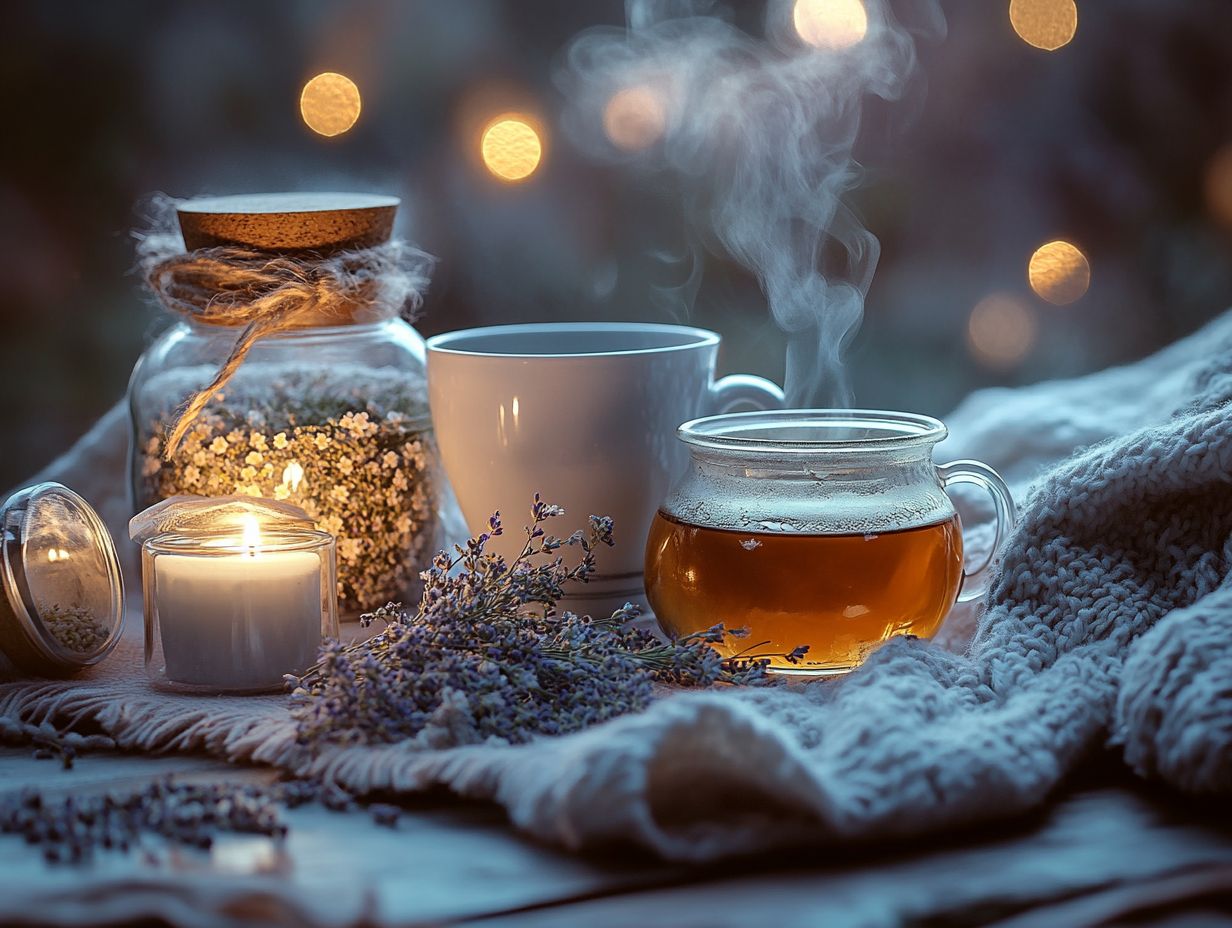
- Chamomile tea is a natural and effective way to improve sleep quality.
- Lavender essential oil promotes relaxation and enhances sleep.
- Valerian root is a popular herbal remedy for insomnia.
- Passionflower has calming properties that aid better sleep.
- Ashwagandha helps reduce stress and promotes a sense of calm for better sleep.
1. Chamomile Tea
Chamomile tea, derived from the delicate flowers of the chamomile plant, is celebrated for its soothing properties as a natural sleep aid. It’s an excellent choice for anyone looking to enhance sleep quality and tackle pesky sleep difficulties.
This herbal infusion has a fascinating history, especially in Greece and Egypt, where it was treasured for its therapeutic benefits. Chamomile contains natural compounds, such as apigenin and chamazulene, that interact with your brain’s receptors, potentially inducing a calming effect to quiet the mind.
Preparing this comforting beverage is simple; just steep dried chamomile flowers or tea bags in hot water for several minutes. Numerous health organizations back its use, suggesting that regular consumption can alleviate insomnia symptoms, solidifying its reputation as a favored natural remedy.
2. Lavender Essential Oil
Lavender essential oil is celebrated for its calming aroma and therapeutic benefits, boosting melatonin production and significantly enhancing sleep patterns. This makes it essential in the world of natural sleep aids and holistic health.
Incorporating lavender into your routine is simple diffuse its soothing scent in your bedroom or add a few drops to a warm bath before bedtime. Studies indicate that inhaling this fragrant oil can lower anxiety levels, paving the way for deeper, more restful slumber.
When applied topically with a carrier oil, lavender promotes relaxation, allowing you to enjoy its benefits on your skin. Research has shown that individuals who embrace lavender essential oil in their nighttime rituals experience noticeable reductions in restlessness and improvements in overall sleep quality.
It truly becomes a trusted companion for anyone striving for a serene and restorative nighttime environment.
3. Valerian Root
Valerian root has earned its reputation as a herbal remedy, used for centuries to tackle a range of sleep-related issues, especially sleep-onset insomnia. This powerful herb offers various health benefits for those grappling with insomnia symptoms.
Recent studies have solidified its effectiveness, revealing that valerian can significantly shorten the time it takes to fall asleep and enhance overall sleep quality. The secret behind its sedative properties lies in its chemical compounds, notably valerenic acid, which may bolster gamma-aminobutyric acid (GABA) activity a brain chemical that helps calm your mind.
Stay aware of potential side effects, such as dizziness, headaches, or digestive discomfort. Proper dosage is vital experts generally recommend taking 300-600 mg of valerian extract about 30 minutes to two hours before bedtime.
Incorporating this herbal supplement into a serene nightly routine, complemented by practices like meditation or a warm bath, can elevate its effects and pave the way for a more restorative night s sleep.
Give these 5 must-try herbs for stress management a try and share your experiences with others looking for better sleep!
4. Passionflower
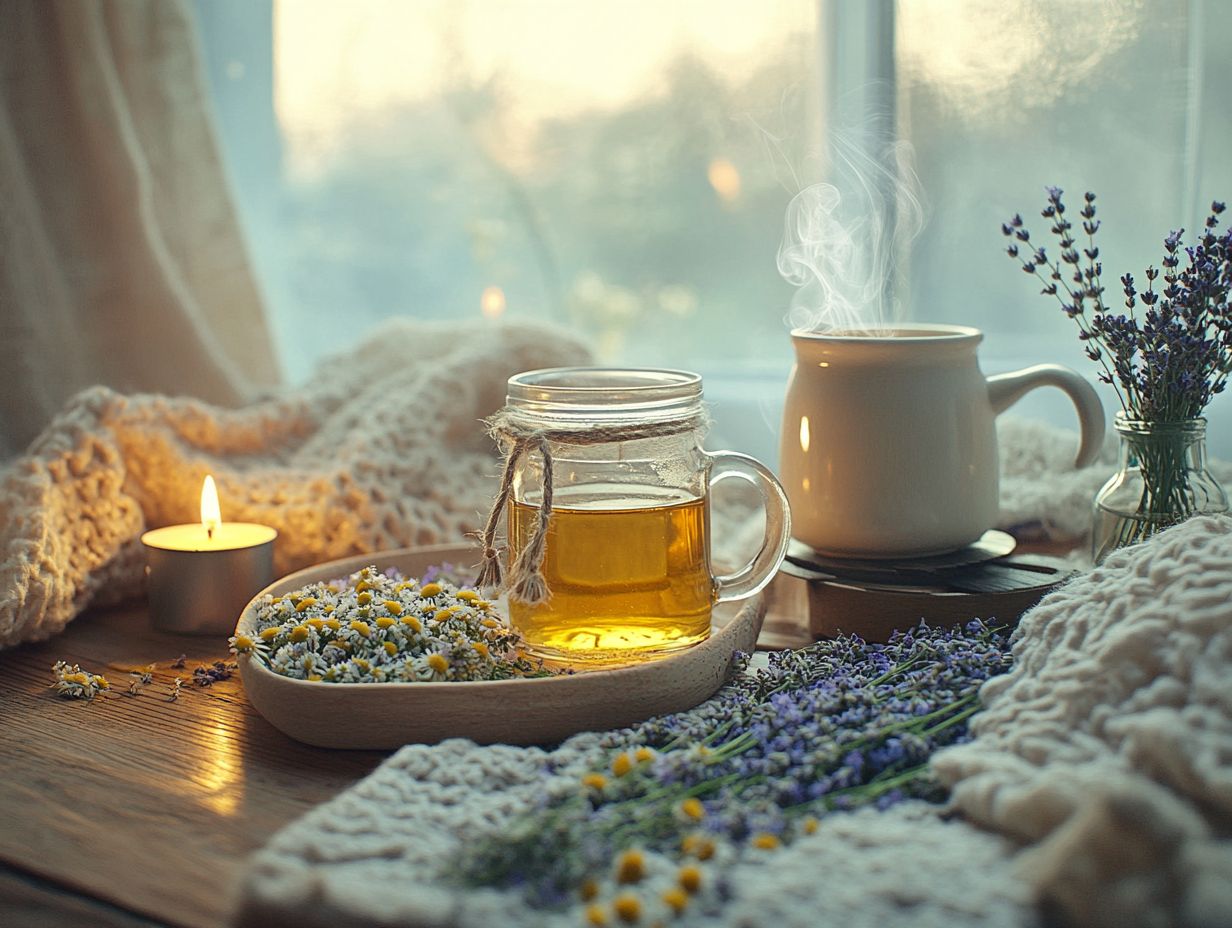
Passionflower is an extraordinary botanical that stands out for its anxiety-relieving properties. It is a favored choice for individuals like you who are in search of natural sleep supplements to enhance sleep quality and tackle stress-related sleep difficulties.
This remarkable plant comes in various forms, including soothing teas, potent tinctures, and convenient capsules. There s something to suit your preferences and lifestyle. Its magic lies in its ability to elevate levels of gamma-aminobutyric acid (GABA) in the brain. This is a natural chemical that helps calm the brain, making it essential for promoting relaxation and alleviating anxiety.
Clinical studies have shown that passionflower can effectively improve sleep quality and diminish insomnia symptoms. This solidifies its reputation as a safe alternative for those seeking to enhance their sleep patterns without the unwanted side effects often linked to pharmaceutical sleep aids. For a delightful bedtime drink, consider trying 5 chai recipes for the perfect herbal tea that can complement your nighttime routine.
5. Ashwagandha
Ashwagandha, a celebrated adaptogen, is gaining recognition for its remarkable ability to combat stress and anxiety. It is an effective ingredient in natural sleep aids aimed at addressing various sleep challenges and fostering restorative slumber.
This extraordinary herb has a rich history in traditional medicine, renowned for its capacity to balance cortisol levels and enhance mood stability. Available in a variety of forms powders, capsules, and teas it s easy to incorporate into your daily routine.
But ashwagandha offers more than just sleep support. It also enhances your overall well-being by boosting energy levels and sharpening mental clarity. By alleviating stress, it creates a calming effect that promotes deeper, more restorative sleep while elevating daytime alertness and productivity.
This multifaceted approach makes ashwagandha a valuable ally for anyone seeking to improve their health and resilience in today s fast-paced world.
What Is Insomnia and How Can Herbal Preparations Help?
Insomnia is a common sleep disorder that can disrupt your nights, making it hard to either fall asleep or stay asleep. This often leads to fatigue, mood disturbances, and impaired cognitive functioning.
Embracing herbal preparations, such as natural sleep aids, can effectively ease these symptoms and enhance overall sleep quality for many individuals grappling with this challenge. Exploring the 5 best herbs for calming herbal teas is a great way to find remedies. Understanding the different types of insomnia acute, chronic, and intermittent is vital for effective diagnosis and management.
Acute insomnia typically emerges from stress or significant life events, while chronic insomnia may be linked to underlying health conditions or ongoing psychological concerns. The causes are varied, ranging from anxiety and depression to lifestyle choices and even certain medications.
If you’re considering alternatives, herbal remedies like chamomile, valerian root, and passionflower could be your key to better sleep! These herbs are known for their calming properties, which can support your body’s natural sleep cycle, making them excellent options for anyone struggling with sleeplessness. For beginners interested in making their own remedies, check out 5 essential herbal preparations that can be a great starting point!
What Are the Benefits of Using Herbal Preparations for Sleep?
Herbal preparations for sleep present a wealth of benefits, including enhanced sleep quality and natural relief from anxiety. They offer a gentle method for addressing sleep issues, making them an appealing alternative for those seeking non-prescription solutions.
Explore exciting alternatives like valerian root and chamomile; they bolster your body’s natural ability to relax by influencing neurotransmitters such as GABA. Scientific studies suggest that valerian root may help shorten the time it takes for you to drift off, while chamomile has been associated with reducing symptoms of insomnia. For a delightful evening, consider trying 5 herbal tea recipes for a relaxing evening.
What’s more, herbal formulations typically lack the jitters or grogginess often tied to pharmaceutical options. This allows for a more restorative sleep cycle. The synergistic effects of these herbs not only target stress hormones but also support overall emotional balance, further underscoring their efficacy as natural sleep supplements. For a calming option, consider soothing chamomile tea for better sleep.
How Can One Incorporate These Herbs into Their Sleep Routine?
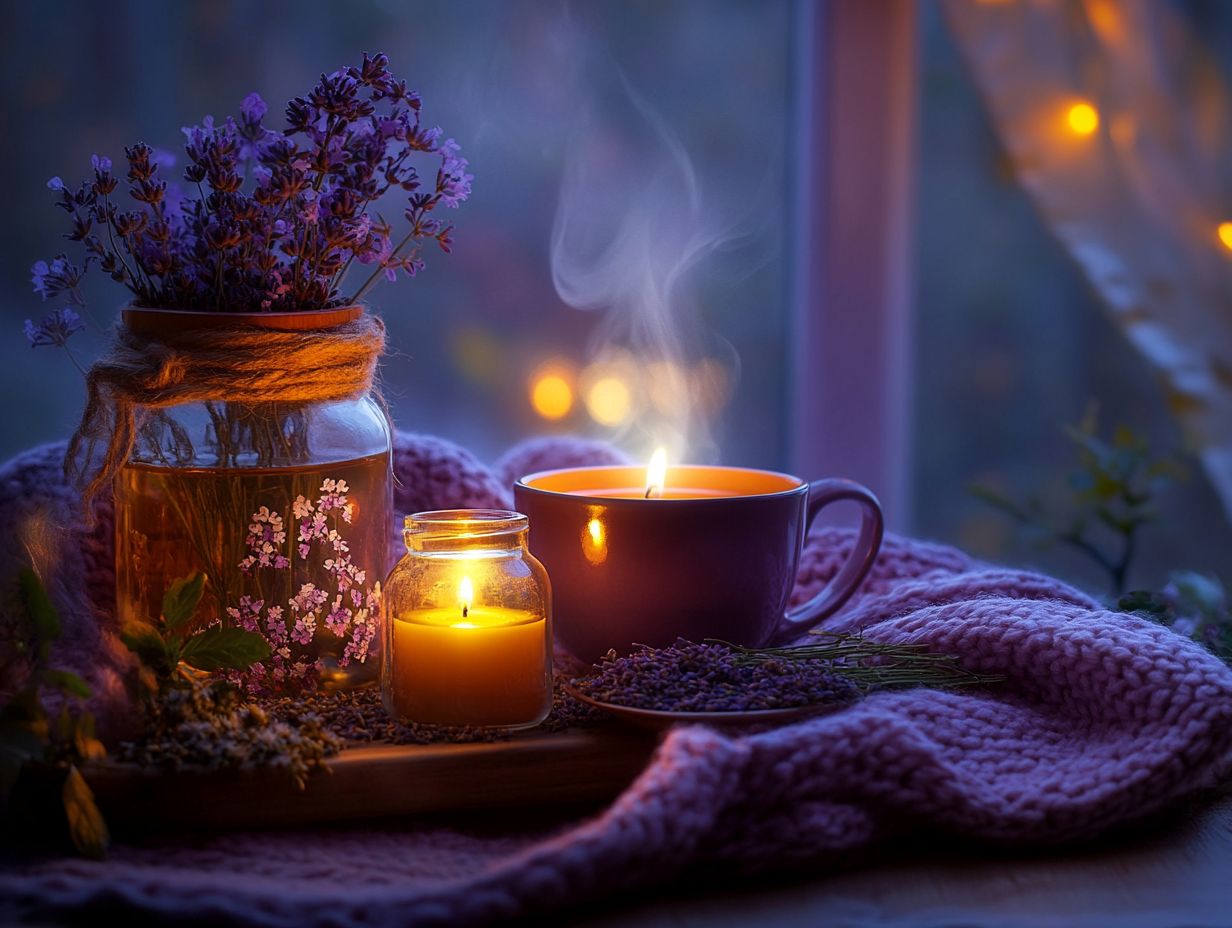
Incorporating herbal remedies into your sleep routine can be a simple yet transformative practice. It enhances your sleep quality and fosters more consistent patterns. This approach allows you to fully experience the myriad benefits of natural sleep aids.
To maximize their effectiveness, pay attention to the timing of your herbal intake. For instance, consider enjoying calming teas like chamomile or valerian root about 30 minutes before bedtime. You might also explore delightful DIY herbal teas for wellness that can gently ease you into a restful state.
Dosage can vary, so start with a lower amount whether in tincture, capsule, or tea form. This gives you the flexibility to adjust based on how your body responds. You might also find that combining herbs like lavender and passionflower creates a synergistic effect that further promotes relaxation. For those interested in enhancing their herbal experience, consider trying 5 delicious herbal tea blends that are worth exploring.
Tinctures are a quick option. You can add a few drops to water or place them directly under your tongue for immediate effects. Whichever method you choose, remember that consistency is key to reaping long-term benefits.
Are There Any Possible Side Effects of Using Herbal Preparations for Sleep?
While you might view herbal preparations as safe sleep aids, it s important to know that they can come with possible side effects. These can vary from person to person. Understanding these potential risks is crucial for making informed decisions about their use.
Commonly reported side effects include drowsiness, digestive issues, and allergic reactions. All of these can significantly impact your overall well-being. If you re managing chronic health conditions (long-lasting health issues) or taking prescribed medications, consult a healthcare provider before incorporating these supplements into your routine.
This precaution helps ensure that any potential interactions are addressed. It also ensures that the sleep aids you choose are suitable for your specific health profile.
Talking openly about herbal options can enable you to make safer choices regarding your sleep health and overall wellness.
What Are the Other Natural Remedies for Better Sleep?
Besides herbal preparations, you ll find a wealth of natural remedies that can greatly enhance your sleep quality. They can address those pesky sleep difficulties, offering you a holistic way to achieve restful slumber beyond just non-prescription medications.
Consider implementing lifestyle changes, such as establishing a consistent sleep schedule, cultivating a calming bedtime routine, and minimizing screen time before drifting off. You might also want to explore dietary adjustments like magnesium-rich foods or soothing herbal teas. Additionally, you can check out the top 5 DIY herbal remedies for stress relief, which can play a vital role in promoting relaxation.
Don t overlook the power of relaxation techniques. Incorporating deep breathing exercises, yoga, or meditation can significantly bolster your ability to unwind. By embracing this comprehensive approach, you re not only tackling immediate sleep concerns but also laying the groundwork for long-term wellness.
This ensures you can revel in restorative sleep and overall improved health.
When Should One Consult a Doctor About Their Sleep Issues?
Recognizing the right moment to consult a doctor about sleep issues is essential, particularly when those difficulties linger. Unresolved insomnia symptoms can escalate into more serious health conditions that impact your overall well-being.
If sleeplessness stretches beyond a few weeks or you find yourself grappling with symptoms like anxiety, depression, or chronic pain, seeking professional guidance becomes imperative. Coexisting health issues can add layers of complexity to sleep troubles. A thorough evaluation is crucial for effective treatment.
While many individuals often gravitate toward natural sleep aids, you must understand now how these might interact with your existing treatments and conditions. This careful assessment ensures that any approach you take encourages restful nights while protecting your overall health.
Your Sleep Questions Answered!
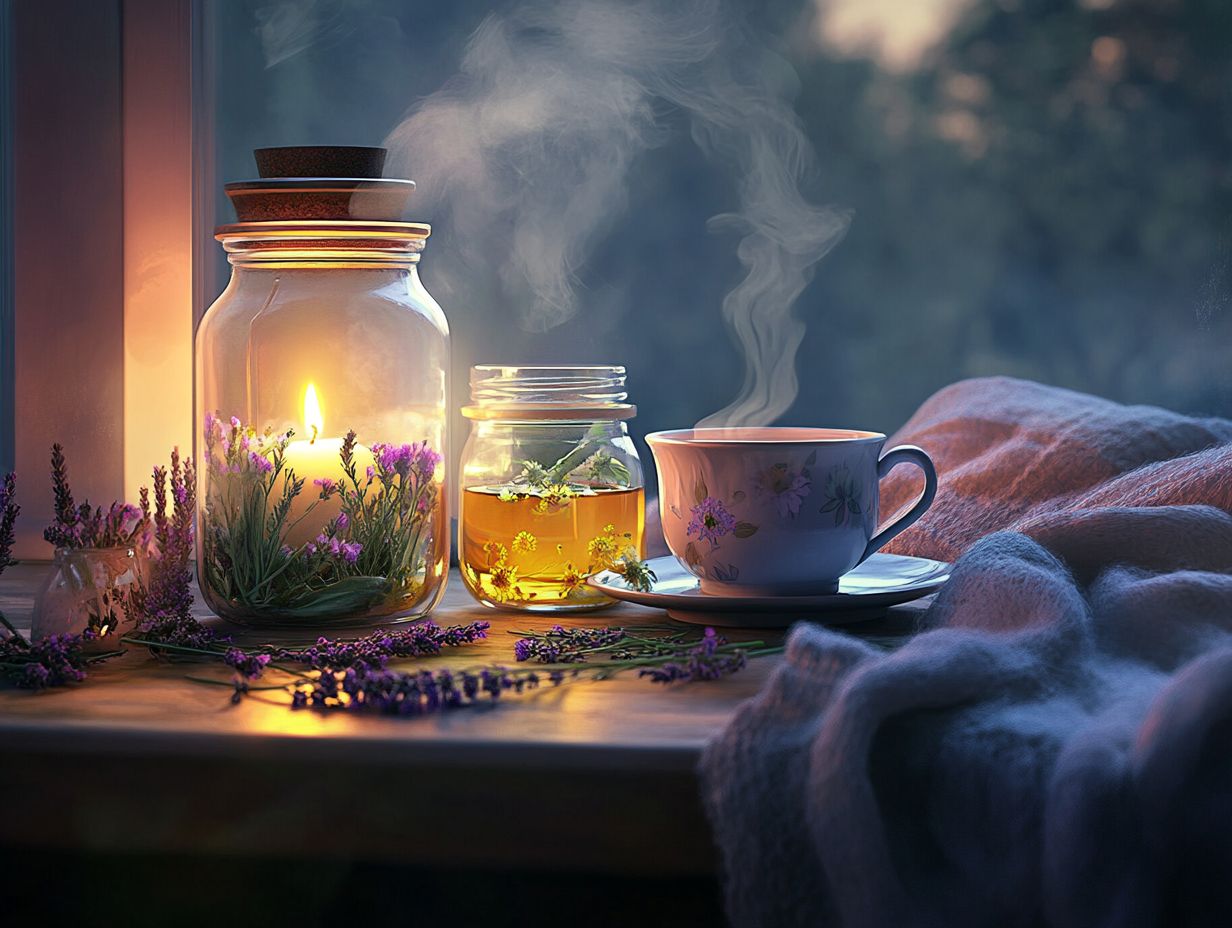
What are the 5 must-try herbal preparations for better sleep?
Try these 5 herbal preparations for better sleep: chamomile tea, valerian root, lavender essential oil, passionflower tea, and lemon balm.
How does chamomile tea help with sleep?
Chamomile tea contains calming compounds. These help you fall asleep and stay asleep more easily.
What is the best way to use valerian root for better sleep?
You can take valerian root as a supplement or drink it as tea before bed. It promotes relaxation and improves sleep quality.
Can lavender essential oil be used in multiple ways for better sleep?
You can use lavender essential oil in a diffuser, add it to your bath, or apply it to your skin. This helps you relax and sleep better.
Is passionflower safe to use as a sleep aid?
Absolutely! Passionflower is a safe and natural sleep aid for short-term use. Always consult with a healthcare professional before trying new herbal remedies.
What makes lemon balm effective for better sleep?
Lemon balm has calming properties that reduce anxiety. This makes it great for people struggling with insomnia or restless sleep.


